… let’s get this jungle ship-shape! We are leaving for Penang. The bare arcades of the train station in Singapore have the feel of a Soviet institution, not that I have ever seen one, except in Polish films and my novel-fed imagination. Smooth. Creepily smooth. Long featureless passageways bear signs saying “Do not loiter or gather”, with a general sense of “forbidden”. This observation is mainly poetic licence, of course. Singapore is not threatening to that degree at all, at all, but subliminally I worried that I might accidentally eat chewing gum and leave it under a chair or on the floor, be found with sleeping pills in my bag and hang for drug offences, or mention the king and go to jail (oh no, that’s Thailand). I’m the sort of person who feels guilty when I even see the police. And new arrivals are form-stamped and scrutinised by staff in heavy brass-button uniforms on entering the country at Changi Airport (even that name has unfortunate connotations, for Australians).
The Singaporean officials at the railway station were not there to be friendly to foreign guests, or possibly anyone else. There were no washroom facilities anywhere in the immense halls, but “across the road”, I was told. That is, somewhere on the other side of a major highway. We lined up with other waiting passengers in a chrome fenced corridor and in due time were stamped through two sets of Customs, one to leave Singapore, the next to enter Malaysia. I do like Singapore, with its polite, orderly people, its cleanliness, its racial mix and history, but have also read about the suppression of dissent, the state organized events to create a feeling of community. Apparently though, that does not work. Tensions simmer.
The Malaysian train was fine, a little worn and shabby, but not at all crowded, and we had taken first class seats (sitting) for the journey of almost 15 hours to Butter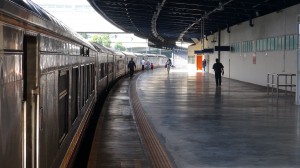 worth. They cost about the same as second class and looked the same, too. When the guard came around with a bottle of water and a piece of banana bread in welcome, he seemed surprised we were going so far – as was anyone else we spoke with. It was fun, as trains always are for a while, to watch the world pass by, first the smaller towns on the outskirts of Singapore, then into the countryside of Malaysia. This noticeable change immediately reminded me of South India and felt familiar, with its mix of new and old buildings in the towns and the blowsy tropical vegetation, roadside puddles of water and big shady trees. It was all so green, so lush.
worth. They cost about the same as second class and looked the same, too. When the guard came around with a bottle of water and a piece of banana bread in welcome, he seemed surprised we were going so far – as was anyone else we spoke with. It was fun, as trains always are for a while, to watch the world pass by, first the smaller towns on the outskirts of Singapore, then into the countryside of Malaysia. This noticeable change immediately reminded me of South India and felt familiar, with its mix of new and old buildings in the towns and the blowsy tropical vegetation, roadside puddles of water and big shady trees. It was all so green, so lush.
But soon the palm oil groves, row after row, began to appear, and the natural rainforest mix to diminish to little pockets beside the rail tracks, or on steep hillsides impossible to cultivate. I kept thinking of the monkeys, the birds, the flowers we had seen at the zoo and all the myriad other creatures – insects, frogs, lizards, pythons and the botanical world – that would have no habitat at all. What becomes of them when the forests are levelled?
The palm plantations stretched as far as the eye could see, up slopes, down valleys and at times right to the rail tracks, at different stages of growth – some very small palms, while others, tall and older, were swathed in lovely parasitic growth of many types of ferns. That pleasing sight was cause for hope, that nature is so resilient.
Strangely, as we travelled, we saw few people on the roadsides, and really none at all on station platforms, except for the odd passenger 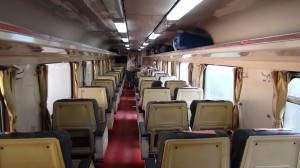 boarding the train. In this way, it was strikingly different to India, where people are just everywhere and the railway platforms are hives of activity, commerce and fascination to the onlooker. In fact, the only people I remember clearly at passing Malaysian stations were a middle aged Indian couple fare-welling their pretty daughter as she joined our carriage.
boarding the train. In this way, it was strikingly different to India, where people are just everywhere and the railway platforms are hives of activity, commerce and fascination to the onlooker. In fact, the only people I remember clearly at passing Malaysian stations were a middle aged Indian couple fare-welling their pretty daughter as she joined our carriage.
After several hours, we resorted to eating the pleasant-enough rice dishes from the dining car, and later a strange chicken hamburger that consisted solely of white bread roll (unbuttered) and chicken patty. We also ate the banana bread, and nuts we had brought along, mainly for “time pass”, as Indians say. We drank very sweet tea from the dining car too; I read my book about Stephen Alter’s childhood in the Himalayas, while Michael was enjoying “The Great Arc”, the fascinating story of the trigonometrical survey of India, which underpinned its mapping. I watched the other people, the passing stations, and snoozed.
A few seats away were two French couples who had also boarded at Singapore. They were animated and chatty, had turned their seats to face each other and played a game of cards, for a while. But as hours went by, we noticed that one of the women was unstoppably garrulous – she just never ceased talking, and not monotonously, but brightly, with animation. Her husband fell asleep, and the other husband appeared trapped by politeness to keep engaging with her, though he resorted to merely nodding. I was astonished at her energy, and immensely grateful I was not travelling with her myself. I too can be garrulous, but only in short bursts – it worries me then that I will be thought unsociable. It was a peaceful relief when they left the train at the station for Ipoh. That name reminded me of Joan and Nico’s journey to Malaysia, with Alex, and I thought of them being here.
The woman sitting opposite was of late middle age and wearing the headscarf and long caftan of Malaysian Islamic women, and had a round olive skinned face with fleshy features, which appeared kindly, intelligent and dependable. She was also ‘time pass’ eating. Eventually we spoke: she and her husband had lived in Australia, in Canberra, in the 1970s, as attaché to the Malaysian Embassy, and her daughter lived there now. They were travelling to their home in Kuala Lumpur. In the near distance, now, I could see the famous Petronas Twin Towers of that city. The KL station was, again, strangely empty – large, antiseptic cement platforms with elevators and not a single person in sight. She left me her newspapers, and a feeling of friendliness, and I began reading with interest.
The editorial was an injunction to Malaysia’s people to accept with good spirits the recent government lowering of the petrol subsidy (meaning fuel prices had increased). It sensibly reminded them that petroleum supplies were limited and that costs would only increase worldwide; it was best to accept this with grace, maintaining a good attitude in life for their own sakes and that of the nation. Hmm. How refreshing! An actual uplifting editorial! Other articles also had an air of positivity about the nation. It was a pleasant change from the depressing carping in Australian newspapers which we have been subject to in recent years, despite our prosperity and security. However, if the newspapers reflect the political views of their boards, then perhaps we will suddenly all be uplifted in Australia too, since the party of big business has now won power. Already, we no longer have to be concerned about vexing points such as climate change, women’s issues, aged care concerns, or refugee arrivals. We don’t even need a science ministry any more. I am reminded of that very funny and accurate song by the Chaser team’s Andrew Hansen, “When They Stop the Boats” (… when refugee boats are prevented from arriving, Australians will all be fabulously rich, will have no sexual problems, their children will all do well in school, etc etc).
On the train, the day changed to night, and the night wore on. We began to feel stale, and the train trundled more slowly the nearer we drew to Butterworth. When it was an hour past its due time to arrive, I began to want to shoot the driver. It’s called “tired-passenger-rage”. It wasn’t as if the tracks had been busy, or the stops many. We would miss the last ferry to Georgetown, at this rate! Finally, inch by inch, we creaked i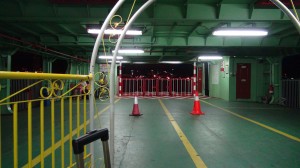 nto Butterworth Station, leapt from the train and rushed to the ferry terminal, seeing the lights of Penang Island sparkling across the water. An hour later we were there, standing by a deserted roadside, ignoring the offers of a lift from a thin, wild looking man in a decrepit, unmarked car, and hoping for a taxi. It came.
nto Butterworth Station, leapt from the train and rushed to the ferry terminal, seeing the lights of Penang Island sparkling across the water. An hour later we were there, standing by a deserted roadside, ignoring the offers of a lift from a thin, wild looking man in a decrepit, unmarked car, and hoping for a taxi. It came.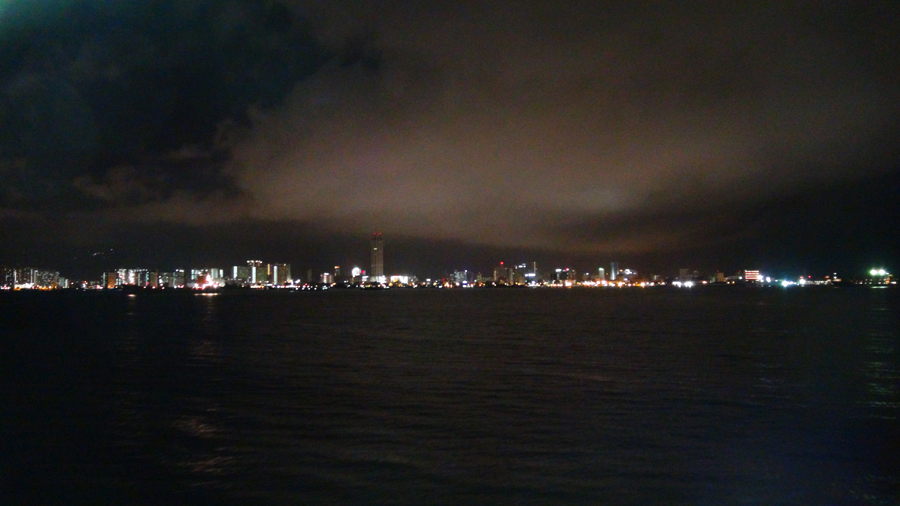
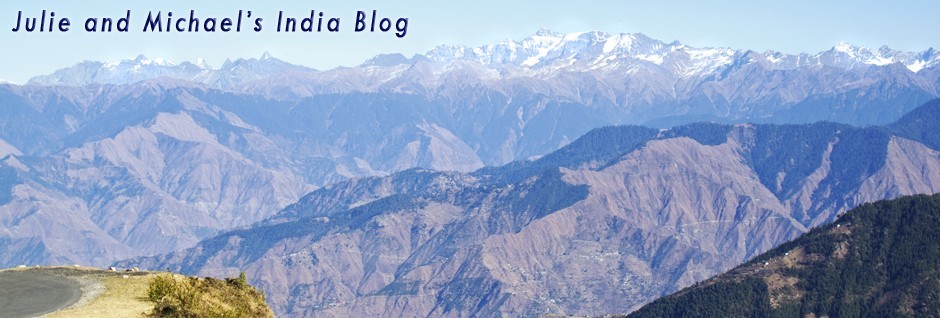
Loved the insight into the Malaysian train trip. Bit long to be on a train though. Some of it must have been in darkness. At least you reached your destination as planned – just!